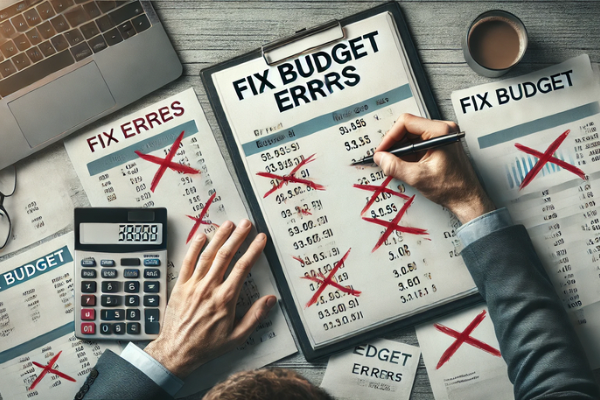Budgeting is one of the most effective tools for managing your money, reaching your financial goals, and reducing stress. But even the most well-intentioned budgeters can fall into common traps that undermine their efforts. The good news? Most budgeting mistakes are easy to fix once you know what to look out for.
In this article, we’ll explore some of the most frequent budgeting mistakes people make—and provide practical advice on how to avoid them. Whether you’re new to budgeting or looking to improve your system, understanding these pitfalls can help you build a more realistic and sustainable plan for your finances.
1. Not Having a Budget at All
Perhaps the biggest mistake is simply not having a budget. Many people rely on mental math or hope that their income will cover expenses without tracking anything formally. This often leads to overspending, missed financial opportunities, and mounting debt.
How to avoid it: Start with a basic monthly budget that outlines your income, fixed expenses (like rent and utilities), variable expenses (like groceries and transportation), and financial goals (like saving or debt repayment). You don’t need a complex system—just a structure to track your money intentionally.
2. Underestimating Expenses
It’s easy to underestimate how much you spend on everyday categories like groceries, dining out, entertainment, or transportation. These small underestimations add up and can throw your entire budget off course.
How to avoid it: Track your spending for at least one full month before finalizing your budget. Use actual data from your bank or credit card statements to estimate realistic numbers. Build in a buffer for unexpected costs or fluctuations.
3. Forgetting Irregular or Annual Expenses
Many people forget to budget for non-monthly expenses like car registration, annual insurance premiums, holiday gifts, or medical co-pays. When these pop up unexpectedly, they can derail your finances and force you to dip into savings or go into debt.
How to avoid it: Make a list of all irregular or annual expenses and divide the total by 12. Set aside that amount monthly in a separate savings account so you’re prepared when those bills arrive.
4. Being Too Restrictive
Creating a budget that’s too tight can be just as problematic as not having one. If you cut out every form of enjoyment—like dining out, hobbies, or entertainment—you may feel deprived and eventually abandon the budget altogether.
How to avoid it: Allow for some flexibility. Include a “fun” or discretionary spending category in your budget, even if it’s small. A realistic budget is one that you can actually stick to for the long haul.
5. Not Adjusting the Budget Regularly
Your financial situation can change due to new income, job changes, inflation, lifestyle shifts, or emergencies. If you never adjust your budget, it can become outdated and less effective over time.
How to avoid it: Review your budget at least once a month. Update your income, review spending habits, and adjust categories as needed. Budgeting is a dynamic process, not a one-time setup.
6. Ignoring Small Expenses
Small purchases like daily coffees, app subscriptions, or online deals can feel harmless in the moment but add up quickly over time. Ignoring these expenses can lead to untracked spending that breaks your budget without you realizing it.
How to avoid it: Track every expense, no matter how small. Use a budgeting app or spreadsheet to log transactions, or review your bank statements weekly. Awareness is key to managing where your money goes.
7. Not Including Savings as an Expense
Many people treat savings as “whatever’s left at the end of the month”—which often results in saving nothing. Without prioritizing savings, it’s hard to build an emergency fund, plan for the future, or prepare for financial goals.
How to avoid it: Treat savings like a non-negotiable bill. Allocate a specific amount to savings in your budget and automate the transfer right after you receive your paycheck. Even small amounts add up over time.
8. Failing to Plan for Emergencies
Unexpected expenses—like a car repair or medical bill—can quickly undo your budget if you’re not prepared. Without an emergency fund, you may have to rely on credit cards or loans, which only increase your financial burden.
How to avoid it: Prioritize building an emergency fund of at least $500 to $1,000 to start. Gradually increase it to cover 3 to 6 months of essential expenses. Include emergency fund contributions as a line item in your budget.
9. Not Setting Financial Goals
Without clear goals, budgeting can feel aimless and discouraging. People are more likely to give up if they don’t see a purpose behind the numbers. Goals provide motivation and context for your budgeting decisions.
How to avoid it: Define specific, achievable financial goals—like paying off debt, saving for a vacation, or building a home down payment. Break them into smaller milestones and track your progress regularly.
10. Letting One Mistake Derail Everything
One of the most common budgeting mistakes is treating a slip-up as a failure. Overspending one week doesn’t mean your entire plan is ruined. Many people give up after a mistake instead of adjusting and continuing.
How to avoid it: Accept that mistakes will happen. When they do, review what caused the issue, make any necessary adjustments, and move forward. Budgeting is a skill that improves with practice and patience.
Final Thoughts: Build a Budget That Works for You
A successful budget isn’t about perfection—it’s about consistency and awareness. By avoiding these common mistakes, you set yourself up for long-term success and greater financial peace of mind. Keep your budget realistic, flexible, and aligned with your goals, and you’ll be far more likely to stick with it over time.
Remember, budgeting is a tool, not a punishment. It gives you control, clarity, and the power to shape your financial future—one smart decision at a time.
